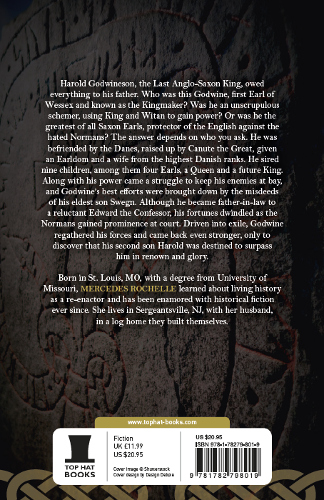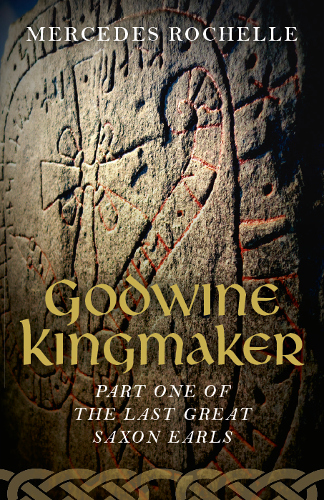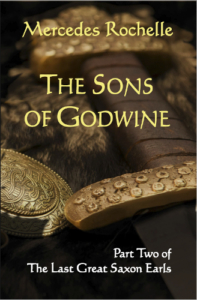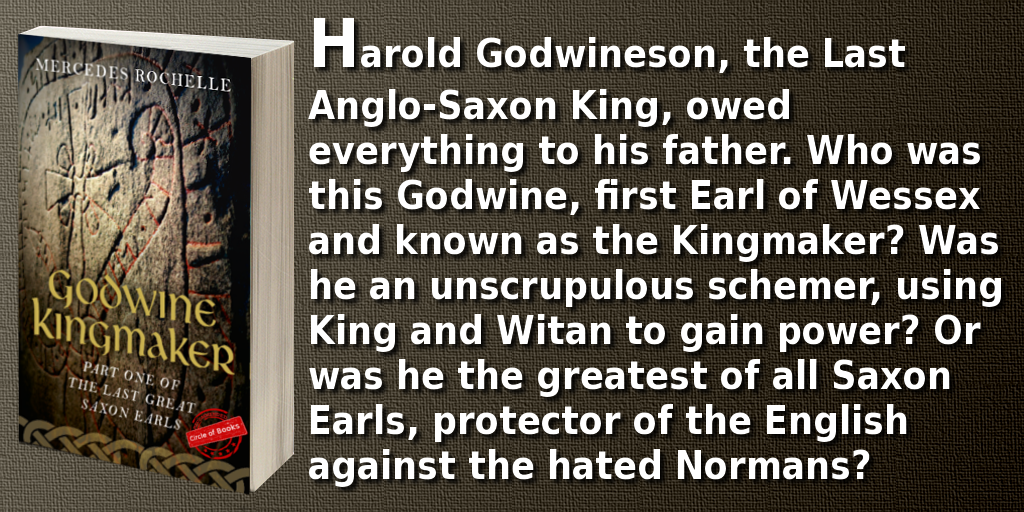Godwine Kingmaker is the first book of The Last Great Saxon Earls historical fiction series by Mercedes Rochelle.
 |
 |
Blurb
Harold Godwineson, the Last Anglo-Saxon King, owed everything to his father. Who was this Godwine, first Earl of Wessex and known as the Kingmaker? Was he an unscrupulous schemer, using King and Witan to gain power? Or was he the greatest of all Saxon Earls, protector of the English against the hated Normans? The answer depends on who you ask. He was befriended by the Danes, raised up by Canute the Great, given an Earldom and a wife from the highest Danish ranks. He sired nine children, among them four Earls, a Queen and a future King. Along with his power came a struggle to keep his enemies at bay, and Godwine’s best efforts were brought down by the misdeeds of his eldest son Swegn. Although he became father-in-law to a reluctant Edward the Confessor, his fortunes dwindled as the Normans gained prominence at court. Driven into exile, Godwine regathered his forces and came back even stronger, only to discover that his second son Harold was destined to surpass him in renown and glory.
A Word from the Author
 The year 2016 was quietly celebrated by medieval historians, for it marked the 1000th anniversary of King Canute’s coronation. This powerful Danish conqueror is mostly known for failing to command the ocean waves, and few stop to realize that the Vikings ruled England for almost forty years. This same anniversary saw the rise to power of Godwine—son of a Thegn in exile who threw in his lot with the invaders. Although our sources are few and far between, they tell us just enough to piece together the story of a great man’s spectacular rise to power. He became the first Earl of Wessex, the wealthiest man in the country and the father of a king: Harold Godwineson, the last Saxon monarch before the Norman Conquest. Godwine’s daughter Editha became queen and four more sons grew up to be earls.
The year 2016 was quietly celebrated by medieval historians, for it marked the 1000th anniversary of King Canute’s coronation. This powerful Danish conqueror is mostly known for failing to command the ocean waves, and few stop to realize that the Vikings ruled England for almost forty years. This same anniversary saw the rise to power of Godwine—son of a Thegn in exile who threw in his lot with the invaders. Although our sources are few and far between, they tell us just enough to piece together the story of a great man’s spectacular rise to power. He became the first Earl of Wessex, the wealthiest man in the country and the father of a king: Harold Godwineson, the last Saxon monarch before the Norman Conquest. Godwine’s daughter Editha became queen and four more sons grew up to be earls.
Harold was not the eldest—in fact, he was second in line. The first, Swegn, was born under a cloud, begat in conflict and unloved by his mother who resented being forced into a marriage beneath her station. The Danish Gytha eventually reconciled and learned to love Godwine, but her feelings never changed toward her firstborn. Godwine tried to make up the difference, but Swegn turned out badly, and Godwine’s best efforts to ensure his family’s fortunes were brought down by the misdeeds of his eldest son.
Once Edward the Confessor became king—with Godwine’s help—the Norman faction rose to prominence and the old Saxon ways began to fade. Harried by the Normans who contrived his exile, Godwine walked a fine line between the demands of his peers and the needs of his family. His enemies won—for a short time—but Godwine regathered his forces and came back even stronger, only to discover that his son Harold had bypassed him in popularity, and looked destined to surpass him in renown and glory.
(Mercedes Rochelle, June 2017)
Get It
Bookdepository (Free Delivery Worldwide)
Other Book in the Same Series
The Last Great Saxon Earls
 |
 |
